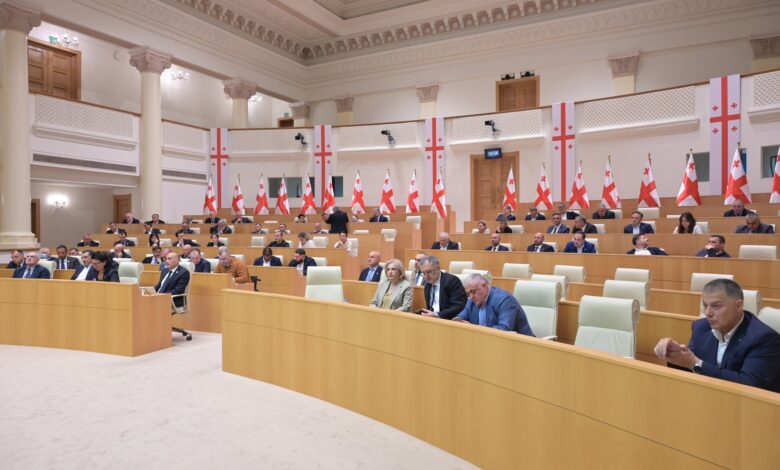
Georgian Dream Bans Financial Crime Convicts From Leaving Country Until Damages Repaid
On September 3, the Georgian Dream parliament adopted in a third and final reading a legislative package requiring individuals convicted of grave financial crimes to repay damages to victims and barring them from leaving Georgia even after serving their prison sentences until those damages are paid.
The changes affected several laws, including Georgia’s Criminal Code and Criminal Procedure Code, and have been awaiting a final vote since GD lawmakers stopped passage at the end of the spring session. In the final reading during the fall session, lawmakers set a travel ban of up to 16 years on offenders leaving Georgia until they repay damages. MP Archil Gorduladze, who presented the package, said most other revisions were only technical edits and corrections. All MPs voted unanimously in favor of the legislation.
“The main point is not the categories of crimes or the length of a conviction set by those categories,” Gorduladze said, noting that was how the length of a travel ban was determined in the previous version of the legislation. “What matters is the damage a specific offender caused to a specific victim. A crime may be minor, but the damage could be large. That is why, based on the scale of the damage, the maximum [exit ban] is set at 16 years.”
The bill was introduced and passed amid prosecutions and arrests of former Georgian Dream officials and business associates. While the ruling party touted an “uncompromising” fight against corruption, critics said the legislation would serve personal retribution and the financial interests of Georgian Dream’s billionaire founder, Bidzina Ivanishvili.
Then-MP Mamuka Mdinaradze confirmed the bill was also “inspired” by the case of Giorgi Bachiashvili, an ex-associate of Ivanishvili who was found guilty of embezzling a large sum of cryptocurrency from him and sentenced in absentia to 11 years in prison before his controversial alleged abduction from abroad and subsequent arrest. In May, Bachiashvili was ordered to repay Ivanishvili nearly USD 900 million in bitcoins.
The legislation lists crimes under which convicts will have to repay damages and face a travel ban, including fraud, extortion, misappropriation or embezzlement, property damage by deception, destruction of property, concealment of assets through sham transactions, abuse of power, and interference with computer systems for financial gain. Most of these offenses must involve damages “in large quantities,” an aggravated circumstance under Georgian law.
A travel ban can apply unless the compensation is repaid, or the victim waives their right to compensation, or the victim consents to the lifting of the travel ban.
To add to the gravity, the law also permits the recovery of stolen or embezzled funds not only from the offender’s assets, but also from the assets of close relatives or other persons to whom the convict transferred property for free or on preferential terms following the financial offense in question, or if the assets were transferred or acquired through a transaction considered as money laundering.
The bill also prohibits informal agreements aimed at alleviating the convict’s lot. Fines or up to three years’ imprisonment are foreseen for the convicted offender who generates undeclared revenue exceeding twice the minimum subsistence level (currently set at approximately USD 100), or acquires real estate or a vehicle through such an arrangement. Similarly, individuals, including family members, who provide such funds or property to the convict may also be subject to a fine and face up to five years in prison, with the property subject to confiscation.
Transferring funds to the personal bank accounts of convicts, if the bank operates under the supervision of the Georgian central bank, or formally transferring property into their possession, will still be permitted, as such assets can be seized to compensate victims.
Also Read:
- 07/07/2025 – Businessman Giorgi Ramishvili Released on Bail
- 21/06/2025 – Ex-Deputy Economy Minister Romeo Mikautadze Arrested on Corruption-Related Charges
- 20/04/2024 – New Tax Law Fuels Worries of Georgia Becoming Black Money Hub
This post is also available in: ქართული